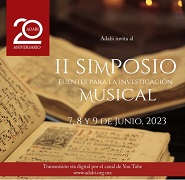Il Simposio Fuentes para la investigación musical
Jennifer Ward
Wednesday, June 28, 2023

From 7 to 9 June 2023, the Mexican organization Apoyo al Desarrollo de Archivos y Bibliotecas de México (Support for the Development of Mexican Archives and Libraries, ADABI) sponsored a three-day online symposium on sources for music research, Il Simposio Fuentes para la investigación musical.
The symposium was organized by Stella María González Cicero, Fabiola Monroy, and John Lazos to mark the occasion of ADABI’s twentieth anniversary. Musicologists, music archivists, and music librarians discussed new publications, conservation initiatives, documentation, questions of access, and primary sources for music research. Against this backdrop, it was fitting that RISM was invited to offer its perspective on source documentation. Indeed, several of the symposium speakers are long-time RISM colleagues.
The RISM talk was part of a session moderated by John Lazos and included presentations by Aurelio Tello, Antonio Ezquerro, and Houman Behzadi. Aurelio Tello began by presenting a new catalog that he co-wrote with Nelson Hurtado, Omar Morales, and Bárbara Pérez, Colección Sánchez Garza. Estudio documental y catálogo de un acervo musical novohispano (Ciudad de México: Instituto Nacional de Bellas Artes y Literatura / Centro Nacional de Investigación, Documentación e Información Musical “Carlos Chávez,” 2022). This catalog concerns a music collection from the convent of La Santísima Trinidad de Puebla that was owned by Jesús Sánchez Garza and now held by the Instituto Nacional de Bellas Artes in Mexico City. It documents nearly 400 works and the catalog is freely available online. Antonio Ezquerro gave us an overview of published music catalogs in Spain and Latin America. Despite my poor Spanish, the significance of the catalogs was clear and I was impressed by the teams of people who have worked over many years to publish these important catalogs. Houman Behzadi delivered a music librarian’s perspective of how information, specifically music source materials, is made accessible to users, drawing upon Lorcan Dempsey’s notion of “facilitated collections” that optimize library resources to meet research and learning needs in the best way.
I pulled the musicological and library threads together and talked about RISM cataloging projects in Mexico and Latin America, highlighting the work of John Lazos and our recent collaboration with the Musicat project in Mexico City, our colleagues in Argentina, and the translating work of RISM Brazil. I showed how the RISM incipit search (either using the RISM Catalog or RISM Online) can lead to new discoveries, and how RISM Online offers national collections and other views that can offer direct access to the catalog of composers or institutions.
From Latin America, the RISM database currently has:
- Bolivia: 7 records (RISM Catalog | RISM Online)
- Brazil: 646 records (RISM Catalog | RISM Online)
- Chile: 93 records (RISM Catalog | RISM Online)
- Colombia: 73 records (RISM Catalog | RISM Online)
- Guatemala: 1 record (RISM Catalog | RISM Online)
- Mexico: 3,075 records (RISM Catalog | RISM Online)
- Peru: 7 records (RISM Catalog | RISM Online)
- Uruguay: 21 records (RISM Catalog | RISM Online)
- Venezuela: 37 records (RISM Catalog | RISM Online)
I closed my talk with an invitation for anyone working on documenting musical sources to collaborate with us. This extends to readers here as well: We would welcome new partnerships with our colleagues in Latin America. Our cataloging program, Muscat, is available in eight languages, including Spanish and Portuguese. Training and the software are provided at no cost. Please get in touch if you would like more information.
The entire symposium was streamed live on YouTube and the recordings can be seen on ADABI’s YouTube channel.
Share Tweet EmailCatégorie: Evénements

